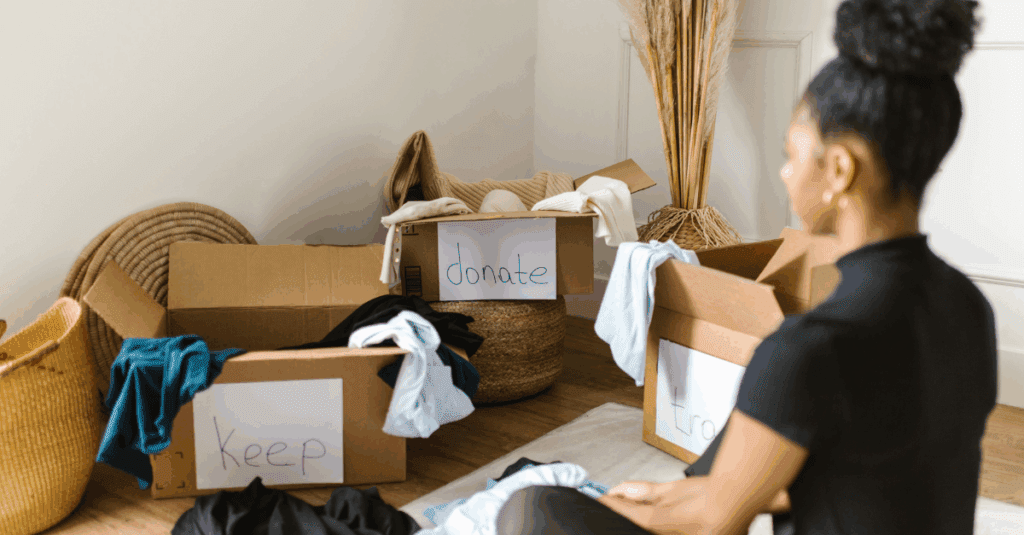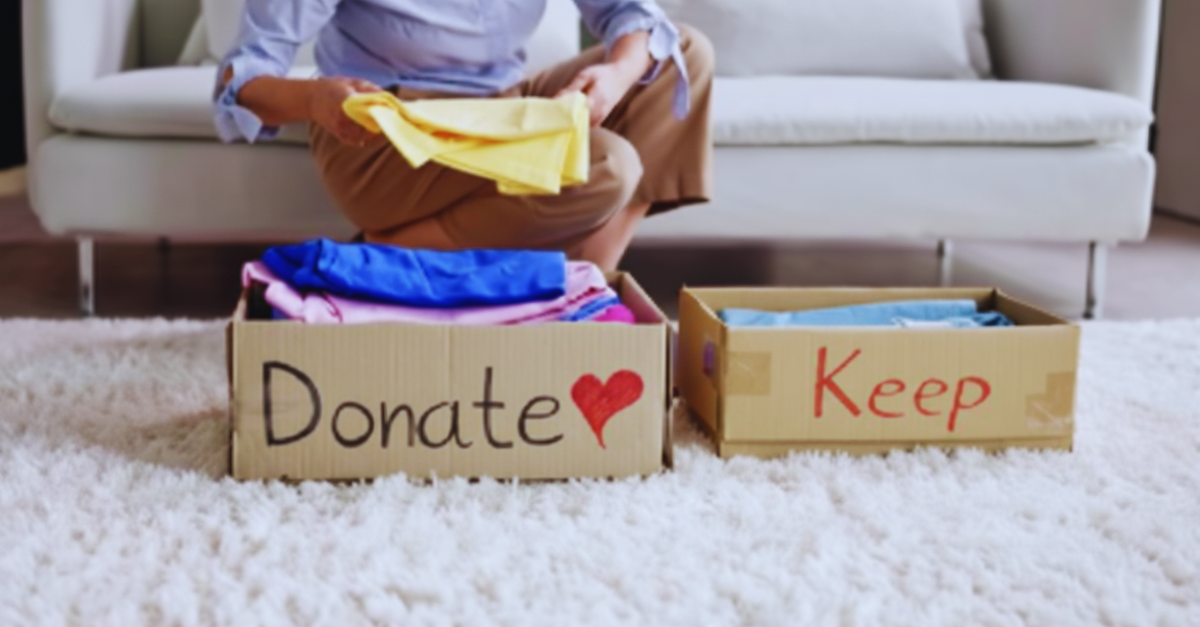It’s a sunny Saturday in Joburg. You want to relax and braai with friends, but your lounge is full of toys and old magazines.
The kitchen counters are buried under jars and dishes. You keep saying you’ll clean up “one day,” but the clutter never ends.
Sound familiar? Many South Africans face the same problem. Our homes fill up fast with things we don’t use anymore.
But you can change that. Decluttering your home brings peace, focus, and space to breathe.
A tidy home doesn’t need to be perfect. It just needs to feel calm and easy to live in.
When you remove what you don’t need, you make more room for what matters: rest, laughter, and time with loved ones.
South African homes are full of life. We shop at busy markets, host family gatherings, and collect things for “just in case.”
Over time, that energy turns to clutter. This guide helps you take control.
You’ll learn why clutter builds up, how to clear it out, and how to keep it gone for good.

Why Declutter?
Clutter doesn’t only fill your space, it fills your mind too. Think about a night during load-shedding.

You light candles, but you can’t find the board games because they’re buried under piles of toys. Frustrating, right?
There are many reasons clutter builds up.
- We buy extras during quick grocery runs.
- We keep sentimental things, like every child’s drawing.
- We save old tins and containers “for later.”
- Garages become storage for broken tools and old boxes.
This all adds stress. Studies show that too much clutter raises cortisol, a hormone linked to anxiety.
It makes you tired, unfocused, and even affects sleep.
When your space is clean, your mind relaxes. A mom in Cape Town shared how clearing her lounge made storytime easier and more fun with her kids.
Decluttering truly reduces stress and helps you enjoy your home again.
Getting Started: Building the Right Mindset
It’s easy to look at the mess and feel stuck. But you don’t need to do it all at once.
Decluttering works best when you take small, steady steps.
Start by asking yourself why you want to declutter. Write it down.
Maybe you want more space for family dinners or quiet evenings after work. This reason will keep you going.
Then, begin small. Don’t aim to clean the whole house. Pick one small area, like your entry table or one drawer.
Set a timer for 10 minutes, play some music, and focus on that one spot.
If you feel lost, start with what you see first, like your front door area. A clear entry makes your home feel instantly lighter.
Remember, progress matters more than perfection. You don’t have to finish everything today. Every small win counts.
The Step-by-Step Declutter Process
Here’s a simple four-step plan that works for any home.

Step 1: Sort Everything
Use four boxes:
- Keep – Things you use daily.
- Donate – Good items you don’t need anymore.
- Trash – Broken or expired stuff.
- Relocate – Items that belong in another room.
Avoid “maybe” piles. They only slow you down.
Step 2: Give Everything a Home
Everything you keep must have its place.
- Use clear bins or baskets to store items neatly.
- Label containers to make it easy to find things.
- Hang bags and jackets on hooks near the door.
If you live in a humid area like KZN, use ventilated baskets to avoid mould.
Step 3: One Room at a Time
Don’t jump from room to room. Focus on one area per week.
Example plan:
- Week 1: Kitchen
- Week 2: Bedroom
- Week 3: Living Room
- Week 4: Garage
Thirty minutes a day is enough to see change.
Step 4: Keep It Clean Daily
Spend five minutes each evening putting things back. Follow a “one in, one out” rule, if something new comes in, remove one old item.

Room-by-Room Declutter Guide
A clean, organized home improves focus, reduces stress, and saves time.
Studies show that clutter can increase anxiety and make it harder to relax.
Here’s a fact-based, direct guide to help you declutter each room quickly and effectively.
Kitchen
The kitchen is often the busiest room in any home. Clutter here slows you down and wastes space.
Facts: According to the National Cleaning Institute, 80% of households keep expired items in their kitchens.
Tips:
- Check expiry dates: Remove old food, expired spices, and half-used jars.
- Clear countertops: Keep only daily-use items like your kettle or toaster visible.
- Organize dry goods: Use stackable containers or labeled jars to save space.
- Streamline utensils: Keep one of each essential item — duplicates cause clutter.
| Item | Problem | Quick Fix |
| Spices | Overflowing rack | Use a lazy Susan or labeled spice drawer |
| Pots & Pans | Hard to store | Hang on wall hooks or a pot rack |
| Snacks | Take up shelf space | Store in clear, airtight bins |
Result: A clutter-free kitchen improves meal prep efficiency and keeps pests away.
Bedroom
Your bedroom should be your calm zone — not a storage area.
Facts: Sleep Foundation research shows that tidy rooms promote better sleep quality and relaxation.
Tips:
- Declutter the closet: Take everything out. Keep only what fits and what you wear regularly.
- Donate unused clothes: Give away items not worn in the last 12 months.
- Clear surfaces: Keep only essentials — a lamp, charger, and a single book.
- Avoid under-bed storage: It collects dust and disrupts airflow.
Result: A neat bedroom encourages restful sleep and reduces mental fatigue.
Living Room
The living room is where families connect — but clutter can quickly take over.
Facts: Cluttered spaces make it harder to concentrate and can even affect mood, according to Princeton University research.
Tips:
- Start with surfaces: Clear coffee tables, TV stands, and shelves.
- Simplify decor: Display only favorite pieces that bring joy.
- Rotate toys: Keep one box out and store the rest to reduce mess.
- Manage books: Stack neatly or donate those you no longer read.
Result: A clean, open living area makes your home feel bigger and more welcoming.
Bathroom
Bathrooms collect clutter fast, especially with daily-use items.
Facts: Studies show that cluttered bathrooms increase bacteria buildup and reduce hygiene efficiency.
Tips:
- Check expiry dates: Discard old lotions, makeup, and medicine.
- Organize toiletries: Use small baskets or drawer dividers.
- Use wall space: Install shelves for towels and personal care products.
Result: A fresh, clutter-free bathroom saves morning time and feels more hygienic.
Garage
The garage often becomes a storage dump, but it can be reclaimed.
Facts: Surveys show 25% of homeowners can’t park their cars due to clutter.
Tips:
- Sort items by category: Tools, sports gear, seasonal decorations.
- Donate or recycle: Remove anything unused in the last year.
- Use vertical storage: Pegboards and wall racks free up floor space.
Example: One Pretoria dad decluttered his garage and finally parked his car inside again, saving time and keeping it protected from the weather.
Result: A well-organized garage gives you more space and functionality.

Essential Tools for Decluttering
You don’t need expensive tools. Most can be found locally.
| Tool | Use | Approx. Price |
| Cardboard boxes | Sorting items | Free |
| Clear bins | Easy storage | R20 each |
| Over-door hooks | Hang bags or towels | R40 |
| Label maker | Organize containers | R150 |
Bonus tip: Join Facebook groups like “SA Declutter Swaps” to donate or trade items easily.
Common Mistakes to Avoid
- Trying to do it all in one day. Take small steps daily.
- Keeping things for emotional reasons. Take photos of special items instead.
- Leaving boxes unsorted. Finish each task fully before moving on.
A local organizer once said, “Clutter is just delayed decisions.” Take those decisions kindly, and your home will thank you.
Conclusion: Your Calm, Clutter-Free Home
You’ve learned the steps, made progress, and found peace in each space. Decluttering isn’t a one-time job it’s a lifestyle.
A clear home gives you time to enjoy what truly matters: family, rest, and peace of mind. Start small today. Even one drawer can make a difference.
Your calmer life begins with one choice — to let go of what no longer serves you.
FAQs
1. What if I can’t let go of family items?
Take photos of special things or keep one piece that means the most.
2. When is the best time to declutter in South Africa?
Spring is ideal, especially before the festive season.
3. How can I get kids to help?
Make it fun. Turn it into a treasure hunt and offer small rewards.
4. Does decluttering save money?
Yes. You’ll stop buying duplicates and find things you forgot you owned.
5. How do I dispose of items responsibly?
Donate to shelters, recycle at malls, or sell online on platforms like OLX.
6. How can renters declutter small spaces?
Use wall shelves and over-door hooks to save floor space.
Check out more of our content:
